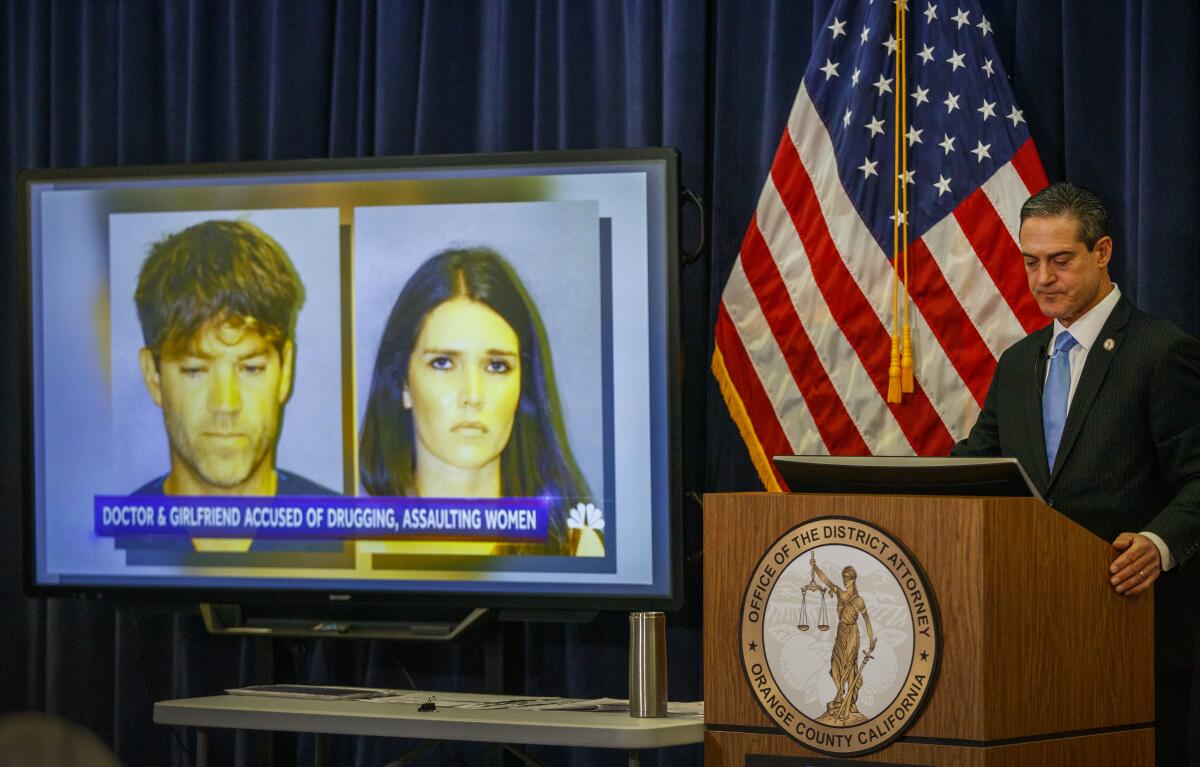Internal memo criticizes O.C. district attorney’s review of Robicheaux rape case

- Share via
Orange County Dist. Atty. Todd Spitzer sought to dismiss rape charges against a Newport Beach surgeon and his girlfriend last year based on a review of evidence in the case that a team of senior investigators in his office later found to be flawed, according to an internal memo.
The investigators’ findings were outlined in a memo sent in July from Cmdr. Clint McCall to Chief Paul M. Walters, who leads the investigative bureau at the district attorney’s office. The Times reviewed a redacted copy of the memo, which was filed in court Thursday.
The top-to-bottom review of the case against Grant Robicheaux, 40, and Cerissa Riley, 33, ordered by Spitzer was “incomplete and contained inaccurate and misleading information,” according to the memo. Those shortcomings led prosecutors for Spitzer to make arguments in court for why the charges against the couple should be tossed out that “contained numerous unsupported allegations, misstatements, untruths, and factually wrong conclusions,” McCall wrote in the memo.
Kimberly Edds, a spokeswoman for the district attorney’s office, said the criticisms investigators voiced in the memo were not a denunciation of the entire review of the Robicheaux case. She said the investigators reached their conclusions about the case review while looking into alleged misconduct by a district attorney’s office employee who was involved in the Robicheaux case and based their findings on a small part of the case review.
“This internal memo was not a legal review of the evidence against Grant Robicheaux and Cerissa Riley or their innocence or guilt,” she said. “This document was the final determination of a personnel investigation into whether an investigator included all pertinent exculpatory information in her police reports.”
The memo and the internal divisions it highlights mark another twist in a case that’s been embroiled in controversy for the last two years.
Robicheaux and Riley, a former schoolteacher, were initially charged in 2018 by Spitzer’s predecessor, Tony Rackauckas. At the time, prosecutors painted the couple as sexual predators who used their good looks to prey on vulnerable women, drug them and take them back to their posh Newport Beach home to assault them.
Robicheaux was charged with sexually assaulting seven women, while Riley was charged with five. The couple have pleaded not guilty and have denied any nonconsensual sex. Defense attorney Philip Cohen, who is representing Robicheaux, declined to comment on the memo.
In 2019, shortly after Spitzer took over as the county’s top prosecutor, he assigned two deputy district attorneys to conduct a review of all the evidence collected in the case. The unusual move came after a prosecutor pointed out “serious proof problems” with the case, Spitzer said at the time.
Over three months, the prosecutors looked at thousands of photographs and videos that had been taken from the couple’s computers, hundreds of hours of audio recordings, thousands of pages of documents and tens of thousands of text messages between Robicheaux and Riley spanning a four-year period.
Ultimately, they determined there was insufficient evidence to prove the case beyond a reasonable doubt. Spitzer accused his predecessor of overreaching on the case to bolster his reelection campaign and moved to have the charges dropped. The request, however, was denied by Orange County Superior Court Judge Gregory Jones. Instead, Jones removed the district attorney’s office from the case and ordered it be turned over to the California attorney general’s office.
During a pretrial hearing Thursday, Deputy Atty. Gen. Yvette Martinez said her office is still reviewing documents to ensure they’ve received all evidence in the case.
“We are conducting a very thorough and independent review of the case,” Martinez said.
Spitzer’s review of the case came under scrutiny during a personnel investigation into an investigator at the district attorney’s office, Jennifer Kearns.
In court filings prosecutors have alleged Kearns omitted pertinent information from reports she wrote about the case and claimed she led a “whisper campaign” to exaggerate evidence in favor of prosecution.
The agency launched a probe into Kearns’ actions and, as part of that inquiry, investigators concluded the review Spitzer ordered had been lacking. Officials also determined that Kearns should receive additional training on report writing.
Matt Murphy, a former prosecutor in the district attorney’s office who is representing four women who have accused Robicheaux and Riley of assaulting them, said Thursday that no one from the attorney general’s office has reached out to the women.
“We’re trying to be cooperative, but I’ve got to tell you nobody from the AG’s office has talked to my clients,” he said during the hearing. “It’s completely unfair to the victims in this case.”
Murphy and others also criticized the decision by district attorney officials to bar Kearns from speaking to anyone from the attorney general’s office about the case without a supervisor present.
Adam E. Chaikin, an attorney for the Assn. of Orange County Deputy Sheriffs, wrote in an email to Walters in October that the directive probably intimidates Kearns from sharing necessary details about the case with prosecutors without fear of reprimand.
Edds said in a statement Thursday that the office has been cooperative with the state attorney general and has turned over all discovery in their possession.
Spitzer “has ensured the attorney general has unrestricted access to all district attorney personnel to aid in its review of the case and to answer any questions or provide clarification,” she said. “The attorney general, not this office, determines who state prosecutors talk to and when.”
More to Read
Sign up for Essential California
The most important California stories and recommendations in your inbox every morning.
You may occasionally receive promotional content from the Los Angeles Times.











